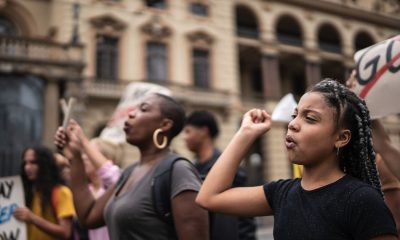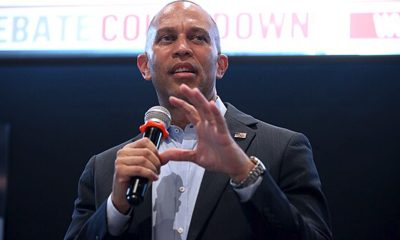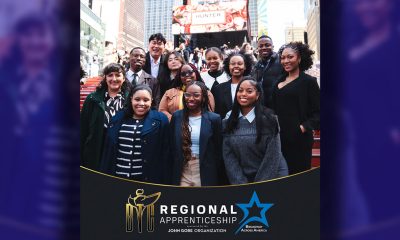Government
Families begin moving into first new public housing in Mpls since 2010
MINNESOTA SPOKESMAN-RECORDER — Families began moving in at the beginning of March and MPHA anticipates full occupancy by the end of the month.
The Minneapolis Public Housing Authority (MPHA) has opened the city’s first new public housing since 2010 to 16 area families experiencing homelessness. The Minnehaha Townhomes are owned and managed by MPHA and families come as referrals from the Hennepin County shelter system. Families began moving in at the beginning of March and MPHA anticipates full occupancy by the end of the month.
The four buildings revitalize a long-vacant site in the East Nokomis neighborhood, donated by the City of Minneapolis. The townhomes include four two-bedroom and 12 three-bedroom units reserved for families below 30 percent of area median income.
At a cost of approximately $5 million, the Minnehaha Townhomes represent the financial contributions of MPHA, Minnesota Housing, the City of Minneapolis, Hennepin County, the Met Council, Federal Home Loan Bank, and Otto Bremer Trust.
“These 16 new units are opening as we embark on our long-term plan to preserve and expand MPHA’s housing across the city,” said MPHA Executive Director Greg Russ. “They also show the level of quality, sustainability, and household amenities we can provide to families when we construct modern public housing.”
Hennepin County’s Coordinated Entry process is designed to ensure that individuals and families with the highest vulnerability, service needs, and length of homelessness receive top priority in housing placement. The townhomes are helping to fill a gap in the process, as 70 percent of families who are eligible for Coordinated Entry are waiting for permanent supportive housing — sometimes spending up to a year in the shelter system.
“This is really a dream project for us as far as needs go,” said Hennepin County Housing Referral Coordinator Sarah Hunt. “For the families that we have been able to refer, it directly correlates with a population that we were unable to send to other housing. The unique nature of these affordable units paired with services is exactly what has been identified as an ongoing need.”
The families who live at the Minnehaha Townhomes receive services from the county and several rapid rehousing providers, offering intensive case management up-front to help families get oriented to the area, assistance with basic housing needs, referrals for ongoing needs, and more.
“The families who have been identified have not had any other options and for them it’s a big boost,” said Hennepin County Shelter Team Supervisor Pat Hartnagel. “It’s amazing to see the things they’ve worked through and accomplished, purely because of the hope to have this housing.”
The wider impact of this housing is being felt for the Hennepin County team already. “It’s one thing to have 16 units open up and allow stability for families to have a place to call home, but it’s also directly opening up spaces in emergency shelter for other families in crisis,” said Hunt.
The site on Riverview Road in South Minneapolis includes a playground, ample green space, and community patio. The townhomes are located on the Green Line light rail between two major job centers—Downtown Minneapolis and Bloomington/MOA/MSP. They are walking distance to the VA Medical Center and Minnehaha Regional Park.
Learn more at https://MPHAOnline.org/Minnehaha-Townhomes
—Information provided by the Minneapolis Public Housing Authority
This article originally appeared in the Minnesota Spokesman-Recorder.
Activism
Oakland Post: Week of November 26 – December 2, 2025
The printed Weekly Edition of the Oakland Post: Week of November 26 – December 2, 2025

To enlarge your view of this issue, use the slider, magnifying glass icon or full page icon in the lower right corner of the browser window.
Activism
Oakland Post: Week of November 19 – 25, 2025
The printed Weekly Edition of the Oakland Post: Week of November 19 – 25, 2025

To enlarge your view of this issue, use the slider, magnifying glass icon or full page icon in the lower right corner of the browser window.
Activism
IN MEMORIAM: William ‘Bill’ Patterson, 94
Bill devoted his life to public service and education. In 1971, he became the founding director for the Peralta Community College Foundation, he also became an administrator for Oakland Parks and Recreation overseeing 23 recreation centers, the Oakland Zoo, Children’s Fairyland, Lake Merritt, and the Henry J. Kaiser Convention Center.

William “Bill” Patterson, 94, of Little Rock, Arkansas, passed away peacefully on October 21, 2025, at his home in Oakland, CA. He was born on May 19, 1931, to Marie Childress Patterson and William Benjamin Patterson in Little Rock, Arkansas. He graduated from Dunbar High School and traveled to Oakland, California, in 1948. William Patterson graduated from San Francisco State University, earning both graduate and undergraduate degrees. He married Euradell “Dell” Patterson in 1961. Bill lovingly took care of his wife, Dell, until she died in 2020.
Bill devoted his life to public service and education. In 1971, he became the founding director for the Peralta Community College Foundation, he also became an administrator for Oakland Parks and Recreation overseeing 23 recreation centers, the Oakland Zoo, Children’s Fairyland, Lake Merritt, and the Henry J. Kaiser Convention Center.
He served on the boards of Oakland’s Urban Strategies Council, the Oakland Public Ethics Commission, and the Oakland Workforce Development Board.
He was a three-term president of the Oakland branch of the NAACP.
Bill was initiated in the Gamma Alpha chapter of Kappa Alpha Psi Fraternity.
In 1997 Bill was appointed to the East Bay Utility District Board of Directors. William Patterson was the first African American Board President and served the board for 27 years.
Bill’s impact reached far beyond his various important and impactful positions.
Bill mentored politicians, athletes and young people. Among those he mentored and advised are legends Joe Morgan, Bill Russell, Frank Robinson, Curt Flood, and Lionel Wilson to name a few.
He is survived by his son, William David Patterson, and one sister, Sarah Ann Strickland, and a host of other family members and friends.
A celebration of life service will take place at Henry J. Kaiser Convention Center (Calvin Simmons Theater) on November 21, 2025, at 10 AM.
His services are being livestreamed at: https://www.facebook.com/events/1250167107131991/
In lieu of flowers, donations can be made to the Euradell and William Patterson scholarship fund TBA.

-

 Activism3 weeks ago
Activism3 weeks agoOakland Post: Week of November 12 – 18, 2025
-

 Activism4 weeks ago
Activism4 weeks agoOakland Post: Week of November 5 – 11, 2025
-

 Activism2 weeks ago
Activism2 weeks agoIN MEMORIAM: William ‘Bill’ Patterson, 94
-

 Activism3 weeks ago
Activism3 weeks agoHow Charles R. Drew University Navigated More Than $20 Million in Fed Cuts – Still Prioritizing Students and Community Health
-

 Bay Area3 weeks ago
Bay Area3 weeks agoNo Justice in the Justice System
-

 #NNPA BlackPress3 weeks ago
#NNPA BlackPress3 weeks agoThe Perfumed Hand of Hypocrisy: Trump Hosted Former Terror Suspect While America Condemns a Muslim Mayor
-

 #NNPA BlackPress2 weeks ago
#NNPA BlackPress2 weeks agoTrump’s Death Threat Rhetoric Sends Nation into Crisis
-

 #NNPA BlackPress4 weeks ago
#NNPA BlackPress4 weeks agoProtecting Pedophiles: The GOP’s Warped Crusade Against Its Own Lies























































